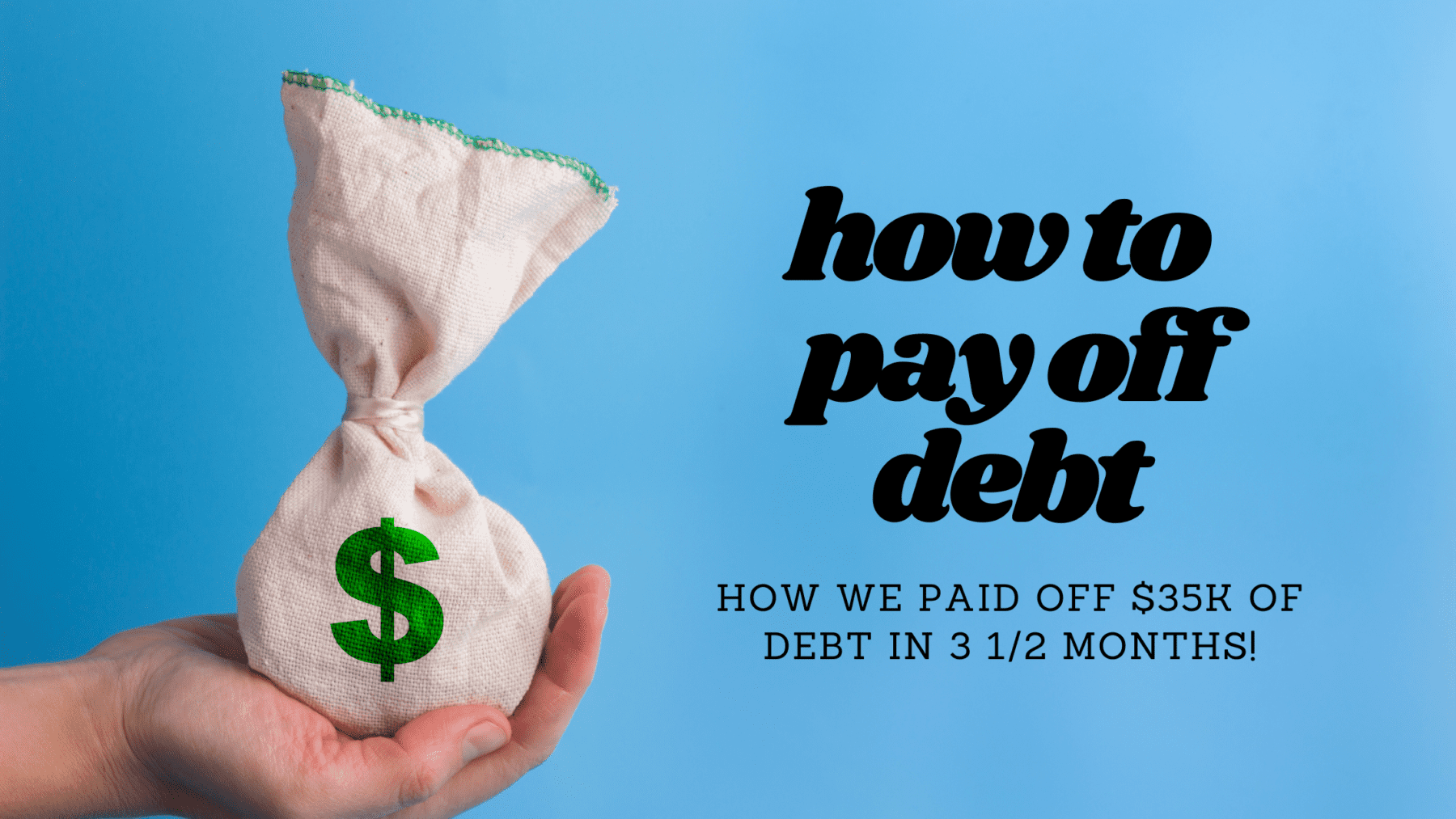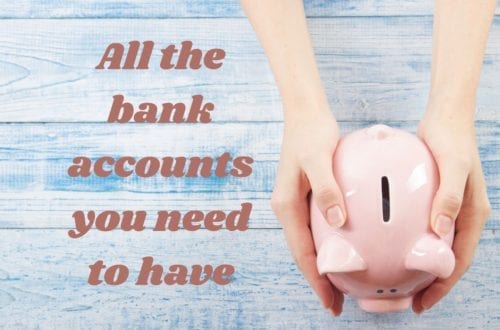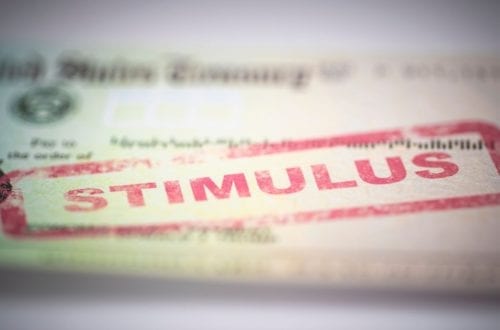
How to Pay Off Debt
As an Amazon Associate I earn from qualifying purchases. We may earn money or products from other companies mentioned in this post at no cost to you!
Reading Time: 6 minutesHow We Paid Off $35K of Debt in 3.5 Months
Why do you think there is an overwhelming amount of content out there to tell you how to pay off debt? It’s because so many people still fall into the debt trap.
Student loans. Car loans. Credit card debt. HELOC’s. Personal loans.
I agree that there can be “good” and “bad” debt (see this article from Budgetology that gives a concise breakdown), but look at the “bad debt” loan totals in the U.S.
Car loan totals are now over $1T (that’s trillion), and they’ve stretched those loans out to nine years. Student loans are now $1.5T as of the date of this post, and continuing to climb quickly. Credit card debt is over $1T, exceeding pre-recession levels and at an all-time high. All this to say is that people are still getting themselves into massive amounts of debt, despite all magazines, podcasts, radio shows, books, blogs, and almost any other medium that tell you not to.
I’m no stranger to debt either, I’ve made my mistakes, too. When I was 23, I bought a car for $19K and used a loan to finance it because I could “afford the payments”. Yes, I could afford the payments- but I also could’ve afforded to set aside the money and pay cash for the car. The interest rate wasn’t even high and I paid it off a few years early, but it still bugs me that I was letting go of my hard earned money like that.
What is probably most irritating to me even years later is that I used a loan simply because that’s what “everybody else was doing”. My parents didn’t do that, so it’s not like getting car loans was a way of life that I was taught. The problem was that it seemed like everybody else did it so I thought it was just “normal”.
You know what was even worse? I thought a car loan would be good for me! My credit report listed “lack of installment loans” as a reason for my credit score not being higher, so I took it as a negative thing. In the back of my mind, I always thought it was weird that not having debt was a bad thing, but even then I still fell into the trap of wanting a higher credit score and that a car loan could help me do that. Oof! I’ve heard people, particularly young people like I was, wrongly fall into this thinking.
Besides the car loan, the only other loan I’ve had is a mortgage. I did, however, inherit $35K in debt when I got married that needed to get paid off. This was a combination of bad car loans and a couple of student loans of my husband’s. He’d been paying them for a while but they weren’t really going anywhere. These are the steps we took to get rid of all that old, bad debt in three and a half months!
Have a plan
You need to budget.
I know you probably didn’t want to hear that, but this is the #1 best place to start paying off debt. If you think you’ll pay extra to your debt after you’ve spent your paycheck on everything else, you won’t. I promise, you won’t. You have to plan it out.
When you use a budget, you know how much you need to survive until the next paycheck comes. You already know what your surplus is from each paycheck, you don’t wait until right before the next paycheck to see if you have an extra leftover to pay your debt. You make your debts payments right away when you get paid and the rest of your money is to live off until the next paycheck.
I have links to my other articles that will help make a budget, making a budget with your spouse, and how to manage your money so you stick to your budget.
Identify your sources of repayment
When I used to do business loans, I would look at their financial history to see if they could repay the money I was lending. I was determining how they were going to pay us back. For most of us, that source is our regular 9-5 salaries. But is there more you can do?
Do you have stock you can sell? Do you have other large items you can sell? Do you need to sell a lot of small stuff to help make a dent in your debt? Are you expecting a bonus? Are you expecting a large tax refund? Do you get paid 26 times per year but budget off two paychecks per months? That’s two extra paychecks per year you could apply strictly to debt.
We used a combination of things: we got a surprise large refund, I knew I was getting an annual bonus, we both had months where we received an extra paycheck (people with bi-weekly pay schedules get this), I sold some stock, I reduced our retirement withdrawals to only be enough to get our matches, and we maximized our paychecks. (See this post for what I mean by maximizing your paycheck.)
Once you’ve identified these, make a calendar of when you’re going to apply these. I made a calendar in Excel of when we got paid, I knew the days I would receive my bonuses, etc. I wrote down (or input, because it was Excel) how much on those dates I would be applying to debt, and what my new debt balances should be. This way, I knew when were going to have all debt paid off.
The reason I suggest taking the time to schedule all this out is to help you visualize having your debt paid off. When you think of paying a mortgage for 30 years, you don’t really think about not having a loan because it’s just part of your normal. Same thing applies with other debt, especially if you’ve had it for a while. I think you’ll be more motivated to stick to your debt payoff plan when you’ve planned your payments and you have a goal date.
Pick your debt pay off method
I’ll start with one of the most popular- if not the the most popular- method, called the “snowball method”, coined by Dave Ramsey. I know there are strong opinions out there about Dave Ramsey, but his debt pay off programs have some merits and you can decide how to use them to approach your own debt.
This is starting with your smallest debt first, moving on to the next largest debts after that, until your last one is paid off. Your smallest debt receives the largest chunk of money while the other debts just receive the minimum payments until it’s their turn to be eliminated.
The reason this method is so popular is that people feel psychological victory once they start seeing debts paid off. The belief is that by the time you get to the largest debt, you’ll be so ready to have all your debt gone that you will be extreme in what you do to pay off that last debt, even though it was larger than your previous ones.
Another method is to pay off your debts that have the highest interest rates first, known as the “avalanche” method. The idea is that you’ll be saving on interest expense. My feeling about it is less about saving on interest and more about you gaining traction. If it’s credit card debt and you’re paying 26% interest on it, yes, you might want to pay that off right away to just stop the bleeding.
You can read more details about both of these methods here.
I am not opposed to consolidating your different types of loans if it’s actually going to be helpful to you. If choosing the snowball method and disregarding the 25% interest on your $10K credit debt to pay off the smaller $5K auto loan with 5% rate first, I think it’s okay to shift that debt to something that doesn’t have as high of interest. Since you already have credit debt, could you move that debt to a card that has a 0% rate for 21 months while you tackle your other debts? That at least stops the bleeding while you’re making some psychological gains in your debt pay down journey. If you do this though, you’d better have a plan to pay off that $10K by the time the interest holiday expires.
We actually used the snowball method. The reasons we did this was because we didn’t have any high interest debts, and I wanted to be able to be focused on the largest ones. What I mean by “focus” is that I wanted all the other little debts paid off so our excess money was “focused” on the largest debt by the time we got to it. Our money was no longer being spread out to other debts.
Closing
We started our big debt pay off a few years ago in mid-February and had everything paid off by the beginning of that June! We were lucky that we each had paychecks to contribute, it was tax season and annual bonus time, which really gave us a big boost to eliminate the debt quickly. I kept a copy of our planned pay off amounts just to remember that we accomplished a lot in a short amount of time, and that we don’t want to go through that again.
I hope this is encouraging to you and will help you be successful in your debt pay off journey. Please check my other articles I’ve linked because they will all help you in this journey. The same methods I employed to pay off debt will also help you after you have no debt and you start building your savings!
RELATED
See my post about how to make a budget if you’re unsure how to start.
See my post about budgeting with a spouse.
See my post about managing your money so you can stick to your budget.
IF YOU WANT TO SEE MORE…
Consider subscribing to my e-mail list. You can always unsubscribe, I won’t spam you!
Follow me on Facebook, Instagram, or Twitter.
Save this post on Pinterest by using the share buttons, and follow me, too!
If you want to start a blogging business, check out this FREE course!
If you want to make money from a blog, check out this program that got me started making my own money blogging!






62 Comments
Alyssa
Great information, my husband and I are lucky we currently don’t have any debt but this is a great resource if you do have some debt.
Ashley
Good for you! So much less stress that way.
Beth Shields
Great encouragement and suggestion. And yes, budgeting helps tremendously. I remember my mom used to take envelopes and write the amount on the outside of the envelope and use that to budget through the month (many many years ago). But being debt free is a great feeling. Thanks for the information and suggestions.
Ashley
There are too many who don’t budget or don’t want to. But it makes life so much easier! Thank you for the comment.
Siobhan
This is great advice! We are currently tackling my husband’s student loan debt. We’ve made a ton of progress which feels great!
Ashley
My husband’s was mostly student loans, too, and over 15 years old! I only had it for a few months (because we got married) and it was bugging me! So glad to be done with it.
Megan
Great info! That’s really impressive you did it in 3.5 months. It definitely takes a plan!
Ashley
Thank you!
Holly
Great tips and advice! I am lucky not to have any debt but my house..and I’m trying to pay off it off quickly!
Ashley
Same here!
Sydney Delong
I have a ton of student debt 🙁 I try to set aside enough money to be able to pay double my monthly payments, and hopefully pay it off sooner than later!
Ashley
Debt really can be a mental suck, can’t it? Try some of my suggestions for bigger chunks to help boost you ahead. Send me a message if I can help you out (no cost).
Christina Siwik
Great information for anyone. Thank you for sharing.
Ashley
My pleasure!
Lisa Manderino
This is great advice! I love that feeling of paying off and freedom!
Ashley
I think it’s exciting!
Sabrina
This is great information. It all starts with a plan. Then you work your plan. I have been completely debt-free excluding the house (working on it now) for the past two years and it has been amazing. Living off one income my business paid off his student loans in 4 months. Thanks for sharing this information. It does work.
Ashley
Oh, I’m so happy for you!
Leeandra
Great tips for paying off debt. I recently learned about the snowball method. Thanks for the information!
Ashley
I hope it will work for you!
Kristin
Debt is a huge issue for so many! How GREAT it feels to pay off debt and live a freer life.
Ashley
Absolutely!
Mariah French
This is great! I think it’s so important to figure out where your money is coming from and where exactly it’s going.
Ashley
Game changer! (virtual high fives to you)
Sabrina DeWalt
Wonderful tips on getting rid of debt. We are not opposed to having some debt (large purchases) but tend to be very selective in what we will borrow for. When we do borrow, we make sure we have room in the budget for paying extra every month so we usually get our loans paid in less than half the term. I love using 0% interest promotions for life’s surprises but always have a plan to pay it before interest starts.
Danielle Ardizzone
This is all great advice! Thanks!
Ashley
My pleasure!
Beth
Great advice about the snowball method. We don’t have large debts except a mortgage but it seems important to get these all taken care of.
Ashley
I’m working hard on the mortgage!
Debbie
Great job! I think discipline and teamwork are just as important as budgeting. So much harder if one spouse isn’t on board.
Ashley
Yep, I have a post about that, too. It’s basically impossible if you aren’t working together.
Marianne
Lots of great advice. The only loan I don’t worry about is my mortgage. We always make sure to pay off credit cards on time. We fell behind in bills after to back to back kids, and ended up adding the debt to our mortgage. Big mistake, but we were young and we learned from our mistakes! I try to teach my kids good money-saving habits. When my 22 year old daughter thanked me for being so tough on her (with regards to finances), it was the best compliment! She just finished 4 years of college and is debt free.
Ashley
Wow, that is so exciting! Yep, we all make mistakes. So glad your children are benefiting from your wisdom.
Barbara
Great tips and advice!
Maria
Wow good for you. I’ve made some serious mistakes in the past as well and have learned the hard way!
Ashley
Experience is the best teacher, right? We live and learn!
Chelsea
Wow! Congratulations on paying off your debt in such a short time! I completed Financial Peace University a couple of years ago and we were able to pay off a lot of debt using the snowball method. So it definitely works!
Ashley
Good for you! I’ve heard the FPU community aspect can help be motivational too.
Erica
Yes! You are so right!! Great advice! We are three months out from being debt free and I wished we had done it sooner!! Great post!
Ashley
Congrats to you! I let my husband take care of it for a while but then it just bugged me too much because it was still “our” debt. I was ready to have it gone!
Suz
Awesome! Good for you. Debt-free is the only (good) way to be. The snowball method…sounds like Dave Ramsey? I completely disagree with his ideas about credit cards – I get so much tremendous value from all my cards! – but, paying off debt should always be Priority #2. #1, of course, is to not get into debt in the first place!
Generally speaking, buying a house is basically the only reasonable reason to go into debt, and if that’s your only debt, it’s easy to pay it off.
Ashley
I’ve never been through DR’s program but I know that method is attributed to him, and why he suggests it. It happened to fit in well with what we were doing. If you have credit card debt at 26% interest, I do recommend doing something about that first- either paying it first or refinancing for a lower rate- so that doesn’t fit with Dave’s program. And agreed on the house. Almost like “good debt”… better to build your own equity instead of paying rent.
Lisa
Wow, that is an amazing feat! Having a plan makes it all so much more manageable.
Ashley
Right! All the years I have in finance and I’m still learning!
Suzan | It's My Sustainable Life
Great tips for those needing to reduce debt! We are working our mortgage loan down as we speak 🙂
Ashley
Same here! Goal is three more years! I should plan a big travel trip as a reward!
Elisabeth
Great read! We currently have paid off all our vehicle loans and are chipping away at our morgage!
Ashley
Good for you! It’s a great feeling, isn’t it?
Tammy
Needed this today! My husband and I both came out from divorce situations that left us in a tough spot! We are working hard to pay off debt and this is just what I needed to read today!
Ashley
I’m sorry to hear you’ve had rough patches, but glad you’ve found each other! I hope tackling this together brings you closer and strengthens your relationship. I’m glad this helped you today!
Alice
These are great ideas. I’ve been working on paying some of my debt.
Wella
I’m glad you were able to separate yourself from the pack of “this is what you should do because everybody else is doing it” to finally realizing what you must do for yourself . Congratulations!
Ashley
Thank you!
Maya
Great post & so informative about the steps to take for financial freedom. Congratulations on making it happen in just 3.5 months.
Ashley
Thank you!
Courtney
Thanks for sharing — although this seems is more for people who are fortunate to have a high income. Making $9,000 per year for four years doesn’t quite allow for so much ‘debt repayment’ as I’d like to do sadly, especially not with over $35,000 in student loans and a need to eat. Snowball method works though — when people have multiple debts, it’s a great technique! As your husband was chipping away without getting his loans down much, mine is sadly the same way for now. Hopefully after the pandemic I can find a job that makes money like yours! Congrats on paying it all off, I’m sure its a HUGE relief!!
Ashley
We did have the advantage of multiple things working for us, like that unexpected tax refund after we got married and were filing jointly. We did also change our tax witholdings to bring home as much money as possible on our paychecks (and then reversed that after paying off the debt so we didn’t owe), which really accelerated paying off the debt. But, taking care of food and shelter is most important of all so you’re doing the right thing. Don’t be discouraged, you’ll get there!
Cindy
It feels SO good to be debt free! Excellent post on getting there and staying there.
Ashley
Preach! It is a good feeling, and thank you.
Interior
I just couldn’t depart your web site before suggesting that I actually enjoyed the standard information a person provide for your visitors? Is going to be back often in order to check up on new posts
Chris
Really enjoyed reading about your debt journey. I especially liked how you ‘fessed about your mistakes; instead of sounding like you would never make a wrong decision as some other “experts” tend do. I learned a lot today! Thanks!
Ashley
My pleasure!